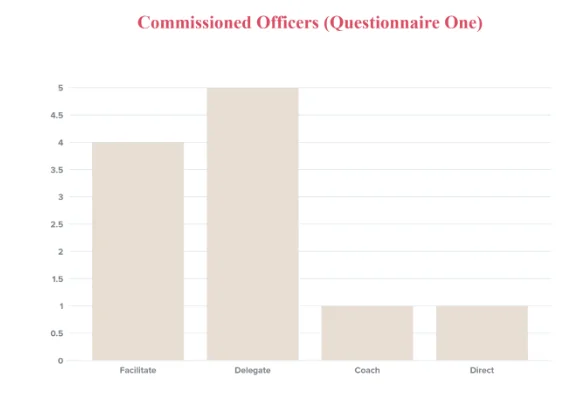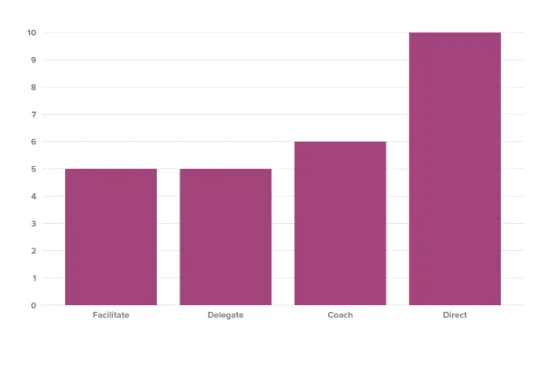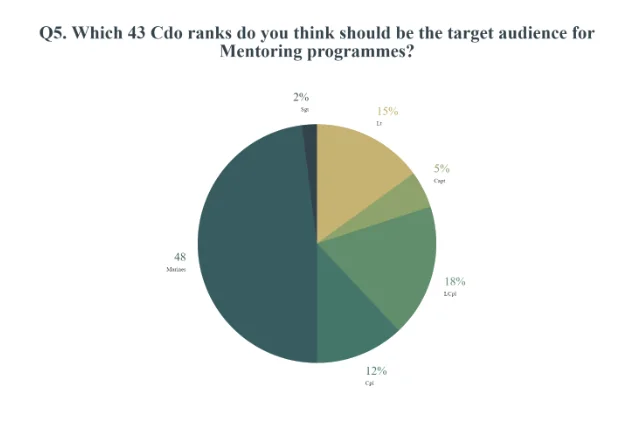Evaluating Leadership Practices in 43 Commando
Introduction
The purpose of this chapter is to provide comprehensive results and study the data collected following the use of the three questionnaires discussed in Chapter 3. By using both quantitative and qualitative data captured from questionnaires and informal discussions, the author aimed to discover whether C&M be should be formally implemented and recorded across the leadership within 43 Commando, Fleet Protection Group Royal Marines.
Demographics of 43 Cdo Leadership
Sandelowski (2000) suggests that “especially useful, is maximum variation sampling, which allows the researcher to explore the common and unique manifestations of a target phenomenon across a broad range of phenomenally and/or demographically varied cases” (p. 337). Therefore, samples were chosen from across a variety of 43 Cdo leadership. The author has provided the makeup of 43 Cdo leadership in Table 5. This also showcases the overall poor response from across the unit.

Questionnaire Responses
The disaggregated nature in which 43 Cdo operates resulted in an overall inadequate response from the organisations’ leadership (Table 5). Coupled with this, was the ongoing factors individuals faced following the COVID-19 pandemic. Questionnaire one was initially sent randomly to 28 Commissioned Officers (Sample A), and 43 Senior Non-Commissioned Officers (SNCO) making up Sample B. Sample B were later asked to distribute 5 per Squadron to the Junior Non-Commissioned (JNCO) within their direct Chain of Command due to the reduced access of military email accounts. With only 37 questionnaires returned, meant out of a possible 90, only 41% responded, with the majority of the responses coming within the Non-Commissioned cohort.
Questionnaire one
Based on Paul Hersey and Ken Blanchard (1982) leadership theory which suggests the most effective leadership style comes from the different situation’s leaders encounter.

As per the above chart, the majority of the commissioned officers was provided with the facilities and delegating leadership style when researcher acquired the data from 43 Cdo in order to determine leadership sits during the variety of situation. On the other hand, only a few commissioned officers considered the importance of coaching and directing. However, the importance of coaching and mentoring has been enhanced on the significant manner in training and development of military personals. The approach of delegation has found very effective when officers have significant experience about different tactics of military personals.

The above chart determines that the majority of participants considered the approach of coaching and directing in the context of leadership practices among non-commissioned officer. In this context, the highest of participants considered the option of direct. The second most preferred option was termed as coaching that could play a critical role in the training and development of military recruits. The approach to facilitate and delegate could not be adopted in the case of non-commissioned officers. It may have a significant impact on the training and development practices, along with the consideration of leadership approaches. In the context of the present study, direct style of leadership has been preferred in the training procedures for 43 Cdo.
Questionnaire Two
As explained in previous paragraphs, the overall unit response was relatively poor. However, as questionnaire two was available online, this made it easier for participants to respond. Therefore, a greater response was received.

With reference to the study goal when the participants were asked about the benefits for 43 Cdo to apply a formalised coaching and mentoring system. This questionnaire was distributed across the entire unit. In the context, 75% of participants were accepted that couching and mentoring would provide significant support in military training and leadership. It plays a critical role in establishing a positive perception of training and development related operations. However, 15% of participants have rejected the argument and did not significant benefits of coaching and monitoring. In the end, the remaining 10% of respondents were not assured about the usefulness of coaching and mentoring in improving the skills and efficiency of military personals along with increasing the effectiveness of leadership.

When the participants were asked about the benefits for 43 Cdo to use internal and external coaches to develop 43 Commando, then 60% of participants were accepted the arguments. On the other hand, 20% of respondents rejected that usefulness of internal and external coaches. In addition to that, 20% of participants were not being assured for appropriateness and reliability of internal or external coaches. Therefore, coaches or mentors in a military training program play a critical role in increasing the efficiency of trainees and the development of leadership among new recruits.

The above pie chart shows the responses of participants about the preference of external coaches rather than internal coaches. In this context, 63% of participants were accepted that external coaches play a critical role in increasing the effectiveness of the training and development process. However, 17% of respondents opposed the usefulness of external coaches in the context of leadership development and other training activities of contemporary warfare. On the other hand, 20% of respondents were not assured by the reliability of external coaches in the formulation of the different training program.

When the participants were asked about the 43 Cdo leadership need to target audience for the coaching program, then respondents provided multiple respondents with reference to goals of the investigation.

As per the above chart, the majority 48% of participants were associated with the marines. Moreover, 18% respondents have had the role of LCpl; 12% of total respondents have had the rank of Cpl, and 15% of the participant were related to Lt. In addition to that remaining proportion was maintained by the Sgt and Cpt. Therefore, the majority of participants were associated with Mariner rank in the mentoring program.

Discussions
In accordance with Ministry of Defence Research Ethics Committee (MODREC) rules, those that cannot remain anonymous during the interview process are subject to approval. For this reason, informal discussions were held with the organisations most senior ranks to discuss their views and opinions on C&M. The present investigation has evaluated the application of different tactics of leadership development among two different types of military personals. In the context of commission officers, the approaches to facilitate and delegation were being preferred by participants. However, other tools, like coaching and directing, were being considered for non-commissioned officers during the collection of primary data. These findings are supported by different past studies that have determined that non-commissioned staff members require additional training and support to improve their tactical skills and professional expertise. In this context, MacLennan (2017) stated that commissioned military officers have already completed several types of training and also gained some professional work experience while their placement in the armed forces. Therefore, the approach of delegation plays a critical role in developing leadership skills among military personals. This is because the delegation of appropriate roles and responsibilities would influence an individual to evaluate different strategic conditions along with the application of different leadership tactics in order to influence the behaviour of others. However, Lancer Clutterbuck & Megginson (2016) argued that there are several challenges were faced by the military personals due to change in technologies and warfare system so as it is not possible that all army’s commissioned personals have appropriate skills and leadership expertise in dealing with contemporary job-related issues. It could reduce the appropriateness of delegation style. The assessment of responses of participants in the present investigation has determined the growing importance of coaching and mentoring operations for non-commissioned officers. This finding is supported by the investigation of Pykett & Enright (2016) in which authors determined that development of Future Commando Force (FCF) has increased the needs of the need for strong leadership along with the high-performance teams that would be able to manage critical job tasks and other combat-related operations. A combination of leadership and followership development is significantly influenced by the education and training; coaching and mentoring and lived experiences that could enable individuals to increase knowledge (Randolph & Nisbett (2019). The present study has determined that the internal or external coaches have played a critical role in supporting the training and development process. In this context, the study of Cornelius, Rosenberg & Sandmel (2019) suggested that C&M plays a crucial part in the developmental process and that leaders and followers should be aware of the processes when developing both themselves and their subordinates. According to theorist’s, development can be applied with consideration of different tools like interaction development, physical development and emotional development. Moreover, Gray, Garvey & Lane (2016) determined that coaching is termed as the catalyst that plays a critical role in implementing the organisational changes and many of the tools and techniques remain pivotal in facilitating behavioural change. Coaching is being considered as the essential element for building organisational resilience, agility and transformation. On the other hand, the findings of Estes, Miller & Majure (2016) supported the growing importance of monitoring. This is because an effective mentoring programme seems a great approach to determine the needs of different individuals during organisational change. In the context of military personal training, the mentoring process helps in the leadership development among military personals because mentoring helps to reinforce a new mindset by building a combined learning approach across the boundaries of rank and job roles. Therefore, the success of the British Army’s Leadership Development Plan (ALDP) is significantly aligned with the coaching and monitoring practices. This learning system would be found very effective to deliver the next generation of trained and competent Non-commissioned Officers (NCO). These individuals would be capable of providing strong leadership as well as also increasing the efficiency of training operations that could attain the complex demands of the future operating environment.
The assessment of responses of different participants derived that external coaching has gained extra popularity in the process of coaching and mentoring of military personal. In this context, the researcher has found similar results in comparison to the result of primary data with reference to past findings. Rennie (2019) stated that internal coaches play a critical role coaching and monitoring process because these individuals have substantial knowledge of internal military culture and work practices. Therefore, these individuals could enhance the effectiveness of leadership development practices. However, the investigation of Kirchner & Akdere (2019) opposed the usefulness of internal coaches because the knowledge of internal coaches has been limited to internal procedures and traditional military practices. Therefore, the new trainee would find several difficulties in providing contemporary knowledge and modern systems of warfare. The demand for external coaches has been enhanced in a significant manner for managing different coaching and mentoring practices. My investigation has tried to evaluate the coaching program on LT’s. In the section of literature review, I have examined the training and development activities for newly promoted officers who are playing a key role in the training of new marines that have not undergoan any leadership training as well as do not have any experiences. Therefore, mentoring for new marines is essential in every changing organisation context. In this regards, Rennie (2019) stated that external coaches had gained vast experience in the field of military technologies and practices. Therefore, these individuals can facilitate new knowledge and professional expertise in contemporary warfare procedures and leadership activities for new marines. This approach would play a critical in the overall development of new military personals and marines. Moreover, external coaches apply various contemporary theories to develop positive perception and to increase the motivation level that could increase the proportion of retention of new trainees. The evaluation of primary data analysis has derived similar results to my previous literature review that have confirmed the importance of C&M.
Reference
Cornelius, K. E., Rosenberg, M. S., & Sandmel, K. N. (2019). Examining the impact of professional development and coaching on mentoring of novice special educators. Action in Teacher Education, 1-18.
Estes, S., Miller, J. M., & Majure, M. D. (2016). Characteristics of army reserve officer training corps leader development. Institute of Land Warfare, Association of the United States Army.
Kirchner, M. J., & Akdere, M. (2019). Exploring Inclusion of Leadership Development into New Employee Orientations: A Proposed Approach from Army Leader Development. Organization Management Journal, 16(3), 156-166.
Pykett, J., & Enright, B. (2016). Geographies of brain culture: Optimism and optimisation in workplace training programmes. cultural geographies, 23(1), 51-68.
Randolph Jr, B. W., & Nisbett, K. (2019). Mentoring leaders across race and gender lines: Insight from US Army officers. Global Business and Organizational Excellence, 38(4), 16-25.
Rennie, A. M. (2019). Here, there and everywhere: psychologists and the training of British Army officers at the Royal Military Academy Sandhurst. BMJ Military Health, 165(2), 109-112.
- 24/7 Customer Support
- 100% Customer Satisfaction
- No Privacy Violation
- Quick Services
- Subject Experts



